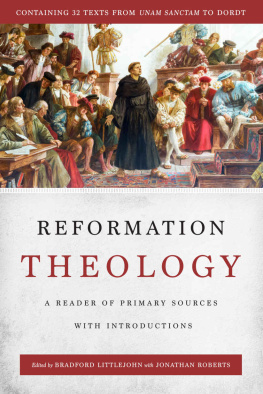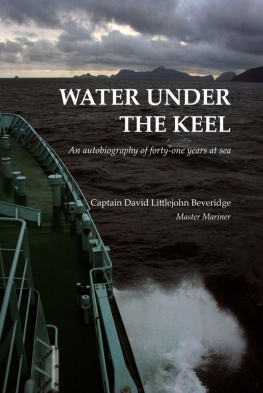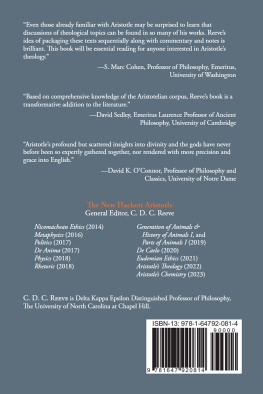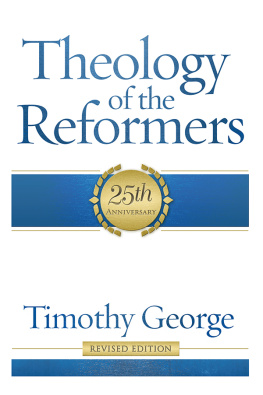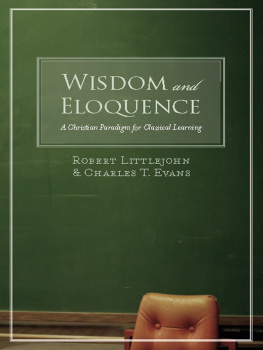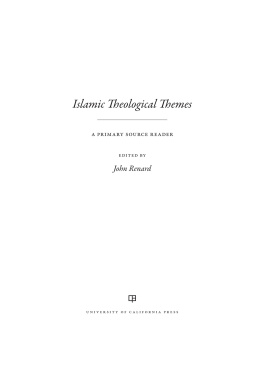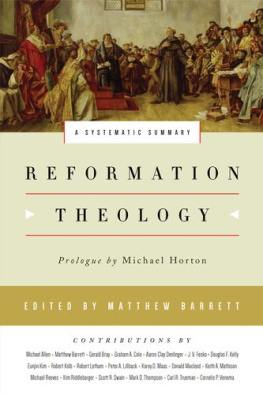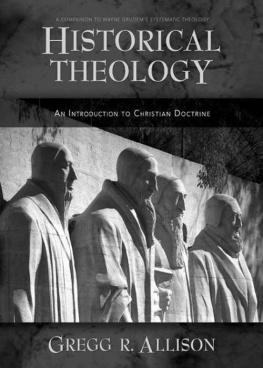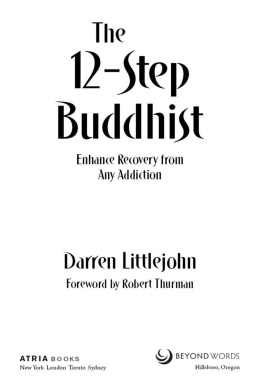W. Bradford Littlejohn - Reformation Theology: A Reader of Primary Sources with Introductions
Here you can read online W. Bradford Littlejohn - Reformation Theology: A Reader of Primary Sources with Introductions full text of the book (entire story) in english for free. Download pdf and epub, get meaning, cover and reviews about this ebook. year: 2017, publisher: Davenant Press, genre: Religion. Description of the work, (preface) as well as reviews are available. Best literature library LitArk.com created for fans of good reading and offers a wide selection of genres:
Romance novel
Science fiction
Adventure
Detective
Science
History
Home and family
Prose
Art
Politics
Computer
Non-fiction
Religion
Business
Children
Humor
Choose a favorite category and find really read worthwhile books. Enjoy immersion in the world of imagination, feel the emotions of the characters or learn something new for yourself, make an fascinating discovery.
- Book:Reformation Theology: A Reader of Primary Sources with Introductions
- Author:
- Publisher:Davenant Press
- Genre:
- Year:2017
- Rating:3 / 5
- Favourites:Add to favourites
- Your mark:
- 60
- 1
- 2
- 3
- 4
- 5
Reformation Theology: A Reader of Primary Sources with Introductions: summary, description and annotation
We offer to read an annotation, description, summary or preface (depends on what the author of the book "Reformation Theology: A Reader of Primary Sources with Introductions" wrote himself). If you haven't found the necessary information about the book — write in the comments, we will try to find it.
Reformation Theology: A Reader of Primary Sources with Introductions — read online for free the complete book (whole text) full work
Below is the text of the book, divided by pages. System saving the place of the last page read, allows you to conveniently read the book "Reformation Theology: A Reader of Primary Sources with Introductions" online for free, without having to search again every time where you left off. Put a bookmark, and you can go to the page where you finished reading at any time.
Font size:
Interval:
Bookmark:
Reformation Theology
Reformation Theology
A Reader of Primary Sources
With Introductions
Edited by Bradford Littlejohnwith Jonathan Roberts
Copyright 2017 The Davenant Institute
All rights reserved.
ISBN: 0999552704
ISBN-13: 978-0999552704
Front cover image taken from HermannWislicenus, Luther vor Karl V. auf dem Reichstag zu Worms 1521 (1880; ImperialPalace of Goslar)
Cover design by Rachel Rosales,Orange Peal Design
Dedicated to thememory of the 16th-century martyrs who gave their lives for truthand the glory of God
TABLE OFCONTENTS
1
Boniface VIII, Clericis Laicos (1296) and Unam Sanctam (1302)
2
Marsilius of Padua, Defender of the Peace (1324), excerpts
3
John Wycliffe, Trialogus (1384), Bk. IV, chs. 26 (on the Eucharist)
4
The Council of Constance, Sacrosancta (1414) and Frequens (1417)
5
John Hus, On the Church (1413), chs. 13, 10
6
Desiderius Erasmus, Julius Excluded from Heaven (1517), excerpt
7
Martin Luther, Ninety-Five Theses (1517)
8
Martin Luther, A Letter to the Christian Nobility of the German Nation (1520),Introduction and The Three Walls of the Romanists
9
Martin Luther, The Babylonian Captivity of the Church (1520), The Sacrament ofthe Altar
10
Pope Leo X, Exsurge Domine (1520)
11
Martin Luther, The Freedom of a Christian (1520)
12
Michael Sattler, The Schleitheim Articles (1527)
13
Thomas More, A Dialogue Concerning Heresies (1529), Bk. I, chs. 19-23
14
Philipp Melanchthon, Apology of the Augsburg Confession (1531), Article IV: OfJustification
15
Thomas Cajetan, Four Lutheran Errors (1531)
16
John Calvin, Institutes of the Christian Religion (1536/1559), PrefatoryAddress; Book I, chs. 16
17
The Council of Trent, Decree and Canons Concerning Justification (1545)
18
The Council of Trent, Decree and Canons Concerning the Most Holy Sacrament ofthe Eucharist (1551)
19
Ignatius of Loyola, Spiritual Exercises (1548), excerpt
20
Heinrich Bullinger, Decades (1549), II.7: Of the Magistrate, and Whether theCare of Religion Appertain to Him or No
21
Peter Martyr Vermigli, Oxford Treatise on the Eucharist (1549), Preface andArguments Against Transubstantiation
22
Martin Chemnitz, Examination of the Council of Trent (156573), Topic IX,Section 1 (Concerning the Sacrament of Order)
23
Zacharias Ursinus, Commentary on the Heidelberg Catechism (1585), Qs. 8691
24
Thomas Cranmer, The Book of Common Prayer (1559), Preface, On Ceremonies, andOrder for Holy Communion
25
John Foxe, Acts and Monuments (1563), The Martyrdom of Thomas Cranmer
26
John Field and Thomas Wilcox, An Admonition to Parliament (1572), excerpts
27
Richard Hooker, Of the Laws of Ecclesiastical Polity, Preface, chs. 1, 4; BookIII, chs. 23; Book IV, chs. 14
28
Robert Bellarmine, Controversies of the Christian Religion (158193),Controversy I, Q. 4: On the Perspicuity of Scripture
29
William Whitaker, A Disputation on Holy Scripture (1588), Controversy I, Q. 4:On the Perspicuity of Scripture
30
Synod of Dordt, The Canons of Dordt (1619)
GENERAL INTRODUCTION
A Story Worth Retelling
AS THIS book goesto press, the crescendo of Reformation 500 commemorations throughout theWestern world is reaching its highest pitch, with innumerable conferences,publications, symposia, blog series, festivals, and more. Protestants are byand large celebrating, while Catholics are mostly trying to remind us how muchdamage the Reformation did and ecumenists are somberly nodding their heads inagreement. Ordinary educated folks, however, might be forgiven for getting abit sick of it all. Was the Reformation really quite that big of a deal? Welive in a society in which hype is the lingua franca of publiccommunication, and cynics might ask whether Reformation 500 is just anotherinstance of it.
Andyet, when all the dust of anniversary commemorations settles, the fact willremain that few episodes in Western history have so shaped our world as theProtestant Reformation and the counter-Reformations which accompanied it. Froma purely secular standpoint, the political and cultural ramifications wereincalculable. Before the Reformation, however many squabbles there may havebeen between king and pope, society in western Europe was a seamless garment,Christendom, in which every power and authority, and every duty and loyaltycould at least theoretically be coordinated in relation to the pole provided bythe Churchs teaching. After the Reformation, this garment was torn first intwo, as the laity and civil authority claimed their own status independent fromthe clergy and papal authority, and then into more and more pieces as nationsand confessions defined themselves against one another.
Thetearing garment metaphor, however, has a rather negative ring to it; morepositively, we might characterize the Reformation as a firestorm tearingthrough an old, stagnant, and dying forest, sowing the seeds for a burst of newand newly diverse life, or as an unchaining, which set the various strata ofsociety and faculties of humanity free to develop under their own power,instead of laboring in obedience to an oppressive hierarchy. It is difficult todeny that the Reformation helped set in motion political reforms, cultural andartistic revitalizations, economic developments, and spiritual renewals thatprofoundly enriched the life of western Europe and indeed through it the wholeworld. Even those most inclined to lament the divisions in the church and theputative disenchantment and desacralization of the cosmos initiated by Luthersreforms would hardly wish to return to the superstition, heteronomy, andcorruption of the late Middle Ages from which the Reformation announced adeliverance.
Ofcourse, when framing such large narratives, we can hardly claim that it allstarted in 1517. Many of the trends which burst forth in the Reformation werealready well underway from as much as two centuries earlier, as the texts inthis book attest, and the religious reforms initiated by Luther took placealongside political and educational reforms, some of which may have happened,or were already happening, anyway. It would be impossibleeven if it weredesirableto try to disentangle the various contributions of the ProtestantReformation and Renaissance humanism, so thoroughly were the two phenomenaintertwined in nearly every part of Europe that the Reformation touched.
Giventhe immense range of cultural, political, and educationalnot to mentionsocio-economicfactors contributing to the Reformation, it may seemtransgressively old-fashioned to compile a book consisting strictly oftheological texts. The nearest equivalent to this volume currently on themarket, A Reformation Reader, edited by Denis Janz, does contain numerous smallexcerpts from theological writings, but fills its pages largely with letters,narratives, and Reformation-era writings on topics as diverse as The Status ofWomen and Eating, Sleeping, and Dying. There is no doubt that, forunderstanding the full lived experience and motivations of the Reformationsmyriad actors, such broad reading is essential. Indeed, the fact that ourreader takes a different tack is not so much a dismissal of the approach takenby Janz, but rather a recognition that there is no need to reinvent thatparticular wheel. However, there is still a need in our 21st-centurycontext, which has replaced ideas with identity or economics, to return to theimportance of theology, of doctrines taught, confessed, and bled and died for,as the beating heart of the Reformation.
Next pageFont size:
Interval:
Bookmark:
Similar books «Reformation Theology: A Reader of Primary Sources with Introductions»
Look at similar books to Reformation Theology: A Reader of Primary Sources with Introductions. We have selected literature similar in name and meaning in the hope of providing readers with more options to find new, interesting, not yet read works.
Discussion, reviews of the book Reformation Theology: A Reader of Primary Sources with Introductions and just readers' own opinions. Leave your comments, write what you think about the work, its meaning or the main characters. Specify what exactly you liked and what you didn't like, and why you think so.

